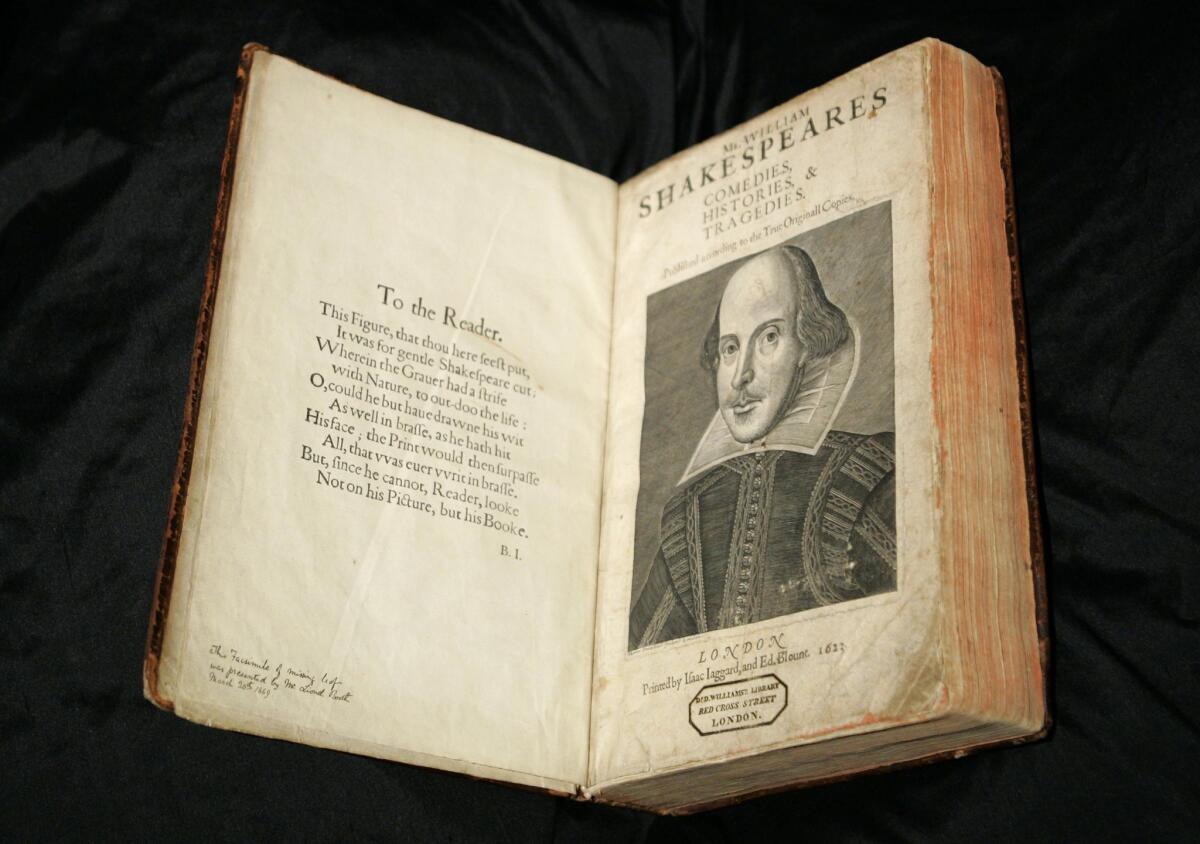Shakespeareâs 450th birthday: Look at his library, get a read on him

If youâre looking for a way to commemorate William Shakespeareâs birthday â he was born 450 years ago today, on April 23, 1564 â the most interesting party may take place at UCLAâs William Andrews Clark Memorial Library in West Adams. From 4-7 Wednesday evening, the library will celebrate not Shakespeareâs writing so much as his reading, with an event called âShakespeareâs Bookshelf.â
This is compelling for a variety of reasons, not least that Shakespeare was a voracious reader, said (in much the same way as John Milton) to have read every book available at the time he lived. His work is steeped in (letâs call it) the lineage of literature, drawing on mythology, history, folklore â in other words, the vernacular of narrative.
The Clark Library has substantial Shakespeare holdings: 14 folios, among other things. But the centerpiece of âShakespeareâs Bookshelfâ is the Paul Chrzanowski Collection, which includes 80 rare books and manuscripts that âare believed to have influenced the playwright.â
These include works by Boccaccio, Chaucer and Plutarch, as well as Shakespearean contemporaries such as Spencer, Marlowe and Sydney, in editions largely from the 16th and 17th centuries; the oldest dates from 1479. In that sense, the collection offers a glimpse at the underpinnings, the foundations, of Shakespeareâs own work, the tradition into which he imagined himself.
A similar logic motivates âShakespeareâs Montaigne: The Florio Translation of the Essaysâ (NYRB Classics: 418 pp., $17.95 paper), edited by Stephen Greenblatt and Peter G. Platt. Montaigne, of course, was the progenitor of the essay (or essai, in his coinage, French for try, or attempt), and as Greenblatt illustrates in a deft introduction, he was an influence on Shakespeareâs writings, particularly âThe Tempest.â
Although Shakespeare was not unfamiliar with French culture, the Montaigne he read, Greenblatt notes, was the 1603 translation by John Florio. The selections in âShakespeareâs Montaigne,â then, âin their rich Elizabethan idiom and wildly inventive turns of phrase, constitute the way Montaigne spoke to Renaissance England.â
Why is that important? Most particularly, it showcases the relationship of writing to reading, the fact that writers are (or should be) reading all the time. âA writer,â in Saul Bellowâs famous formulation, âis a reader moved to emulation,â and this was as true of Shakespeare as it was of anyone.
By understanding what he was reading, we get a better sense of his place in the trajectory, the conversation, the ongoing dialogue in which we all participate to this day. That is Shakespeareâs true legacy, his sense of engagement, which is why, on his 450th birthday, his work remains so relevant, attuned as it is to the most essential human concerns.
ALSO:
James Baldwin, poet? But of course.
Gabriel Garcia Marquez: Five essential reads
You âfen-sucked brassy nut-hookâ ... and other Shakespearean insults
More to Read
Sign up for our Book Club newsletter
Get the latest news, events and more from the Los Angeles Times Book Club, and help us get L.A. reading and talking.
You may occasionally receive promotional content from the Los Angeles Times.









